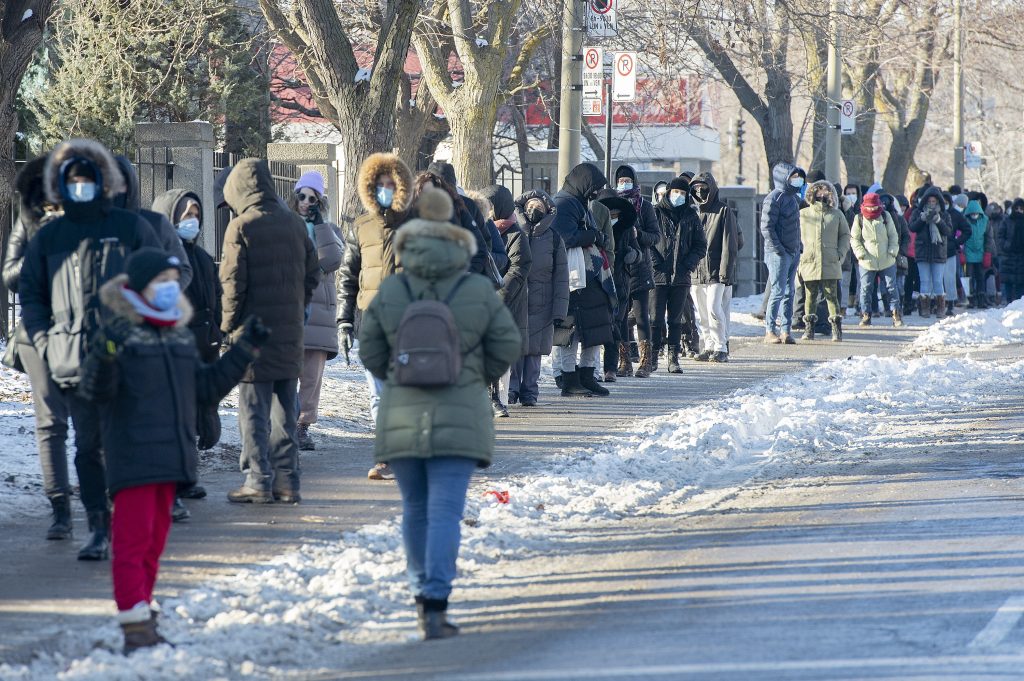Canada News
Quebec testing centres overwhelmed by the fifth wave of COVID-19

MONTREAL — COVID-19 testing centres in Quebec are being overwhelmed by the pandemic’s fifth wave, with long lineups to get a test and delays in results as the Omicron variant pushes daily case counts to record levels.
The union representing 5,400 laboratory technicians in the province says the recent surge in demand for testing is putting a strain on laboratories.
“There’s a feeling of despair. Those who are young enough to change career are doing so, while those who are close to retirement leave to enjoy their health,” Sandra Etienne, a vice-president of the Alliance du personnel professionnel et technique de la santé et des services sociaux, said in an interview Monday.
Etienne, who works as a biomedical laboratory technician, said that during the pandemic medical technologists have yet to receive the recognition given to nurses — who were offered $15,000 in bonuses to keep them from quitting the public system in the fall.
“They are reacting like soldiers right now,” Etienne said of laboratory technicians. “But soldiers who are asking to be recognized.”
Quebec Health Minister Christian Dubé on Monday asked that only people with symptoms seek a test. But Dr. Donald Vinh, an infectious disease specialist and medical microbiologist at the McGill University Health Centre, said the policy is misguided.
“We are weakening ourselves,” he said. “We are shooting ourselves in the foot by restricting the testing.”
Vinh said Quebec can’t afford to have asymptomatic people spreading the virus. Based on current levels of testing and likely numbers of contacts, he estimated that as many as 15,000 asymptomatic people aren’t currently being accounted for in Quebec. They are “walking around infected, but not able to get tested and potentially transmitting,” he said. “It’s not a small number.”
The solution, Vinh continued, comes through at-home rapid tests, but “the availability of those tests has been poor.” On the day after the province made rapid test kits available in pharmacies across Quebec, many locations in Montreal — which has the highest number of active cases in the province — were already out of stock. He said it would have been more efficient to distribute the tests through the mail.
Labs in Quebec have recently been processing around COVID-19 tests a day, hitting a high of 46,830 on Dec. 15. They have reached their “maximum capacity,” Dubé said Monday, adding: “Testing centres should not be a tool to get tested if you’re asymptomatic and you want to gather with your loved ones.”
He asked people to prioritize at-home rapid tests to avoid clogging laboratories. The provincial government has pledged to distribute more than 800,000 of the rapid tests by Christmas.
Annie-Claire Fournier, a spokeswoman for the McGill University Health Centre, said its laboratories, which on average analyze 15,000 tests per day, have recently seen an increase of as many as 1,000 tests a day.
“Ninety-nine per cent of analyses are performed within 24 hours,” Fournier said in an email. The results are usually shared with patients within 24 to 48 hours, she added.
For Dominique Primeau, who had been waiting for her results for two days, the delay was a source of stress. She said Tuesday that she started to experience COVID-19 symptoms on Saturday. She tried to get tested on the south shore of Montreal but couldn’t find a walk-in clinic.
She next tried a drive-thru testing site in Montreal, but it was closed on Saturdays. She went to another clinic but there was “a never-ending line” and it closed before she could get in. Primeau said she finally got tested on Sunday, after waking up at 5 a.m. and waiting almost two hours in the cold.
“It’s never fun being sick and not knowing what you have,” Primeau said. “I want to know what kind of holidays I’ll be having. If I have COVID, I have to isolate, I have to cancel plans. It’s not easy.”
Primeau’s experience won’t be unique as testing centres hit maximum capacity. Jean-Nicolas Aubé, a public health spokesman at CIUSSS du Centre-Sud-de-l’Île-de-Montréal, one of the city’s largest health authorities, said the authority usually handles 1,500 tests a day but is now above 2,000.
“It’s been a major increase and it continues,” he said in an interview. “The demand is high, but we will adjust.”
Aubé echoed Dubé’s advice that people should go to testing centres only if they have symptoms.
“People are coming to get tested because they have a party,” he said. “We heard it, we saw it, we understand, but now we have to make room for people who have symptoms.”
This report by The Canadian Press was first published on Dec. 21, 2021.
Virginie Ann, The Canadian Press
Note to readers: This is a corrected story. A previous version said Primeau had been waiting three days for her results.





















